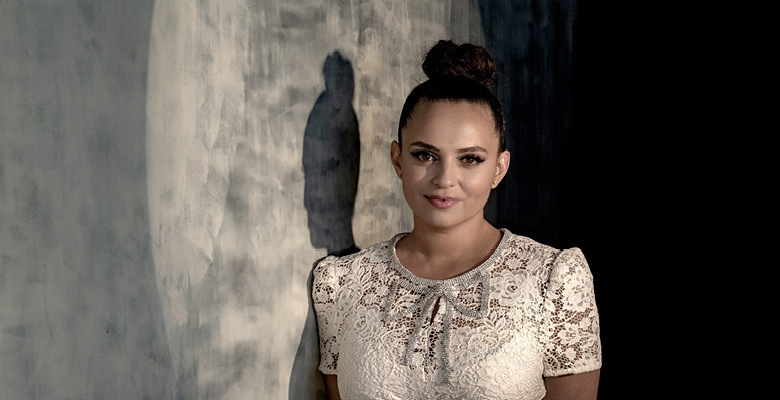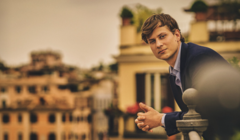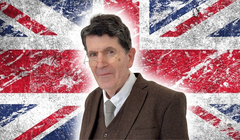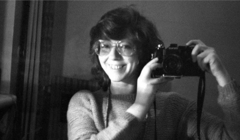
Golda (Tatiana Amirova) is a singer, European cultural ambassador and contestant on Holos Krainy, the Ukrainian version of The Voice. On November 28 and 29, she performed in an eponymous musical, ‘with an Odesan Temperament’ on the stage of the Tabernacle Theatre in London. On the eve of the premier, we talked about London, being creative in a foreign land and the need for love and happiness in difficult times.
The clock says 8:30 in the morning, and you’re remarkably wide awake. Do you always get up so early? What’s your schedule?
My schedule is unbelievably full; 40 premiers. At 6:30 I’m already on my feet, running off somewhere and I only get back at night. Part of the team I used to work with in Kyiv is sharing a house with me. We rehearse every day from morning to night. I wake up and fall asleep surrounded by creative energy

Tell us what your musical is about
It’s a musical spectacle. My internal perfectionist does not allow me to call it a proper musical yet. The genre presupposes a different scale; a large number of roles, vocal parts and dance numbers. For the core of our production, we have taken a production which I created three years ago with the leading Ukrainian director Elena Kolyadenko and her team. Later the Ukrainian choreographer and director Pavlo Bondarenko also worked on it. It was very well received in Ukraine. I have always dreamt of making a show about Odesa, to tell the whole world about the city and to tell foreign audiences a little about its culture, but it’s not a simple task. We took my own story as the basis; the story of a Jewish girl who was born and grew up in Odesa surrounded by a big Jewish family. The family dreams of marrying off the daughter, but she resists because her dream is to be on the stage and give her music to audiences. However, not all her suitors are ready to accept this, some give in straight away and others later on.
I can just hear the chorus from the family: “When are you getting married? When will you give us grandchildren?”
That chorus never quite goes quiet, it’s always ringing out, whether quietly in the background or loudly and insistently, still, I’ve long come to warm, friendly terms with it. The events of the play take place in an Odesa apartment (it’s as if it were my own home), and everyone on the stage, all the musicians and dancers, represent a part of that life. I have combined everything I love the most; songs in Yiddish, musical Jewish culture and my home town. These things are all part of me. We’ve taken well-known songs, loved by different generations, made my own interpretation of the compositions, and added some musical numbers and theatrical cabaret in a modern-vintage style.
What was the Ukrainian production like and what awaits the London audience?
Their performance was a creation of my own efforts, made in one burst of activity which kept itself going for two and a half years. It was an immersive show; I went out into the audience, gave out stuffed fish and looked for a suitor in the crowd. It was bright, fresh and positive, with no hint of tragedy. We put it on for the last time on February 22. The hall was full, my mum called and said there were queues outside to get in. After that date, normal life stopped dead, we all went separate ways and although we’d just performed together on the same stage, everyone’s fates were very different; some lost their families, some their homes, some emigrated and others stayed behind. The hand of fate brought me and Pavlo Bondarenko, the director of the Ukrainian production, together again in London. God had sent me like-minded people, including the producer Aleksandrina Markvo. Our joint energy led us to a different story about the same flamboyant, vivacious and restless girl from Odesa whose family is still trying unsuccessfully to marry. She is still resisting, but, one day, she finds true love. At the culmination of the wedding, the war starts and the emotional key of the performance changes completely. The heroine emigrates, but in her new country, she unwaveringly continues to follow her dream. We are showing an absolutely real story, my story, adapted for the stage.
How did Britain receive you?
It was all new except the language! Everything from how you have to manage your money to the nuances of how people communicate here. The mindset here is completely different, no one knows you, you have to arrange everything in advance and write long letters, even if you only have to settle a matter that can be explained in one sentence. A wonderful Lonon family has taken me in. In the early days, I started singing in clubs and restaurants for very little remuneration whilst sending out stacks of CVs. I visited venues and found out what the decent places to perform were.

How much rumination is very little?
I got £170 for five hours performing in a club. In Ukraine, I filled halls, travelled the world and took part in Holos. Of сourse, it wasn’t quite the scale of a pop star, but I had steady work and good prospects. I had signed a contract with a major producer a month before the war and this was all destroyed. Returning to restaurants was not very pleasant, to put it mildly, but I put up with it heroically.
Did you come to London straight away?
First I travelled around Europe giving charity concerts in support of Ukraine and then I moved to Israel where part of my family had already relocated. I acquired citizenship and visited London on short trips, but eventually, I realised that I had to follow my creative path here, so I rented a shared room with my neighbour and everything took off with amazing speed.
In London, there are Jewish districts and communities. Did you manage to feel a part of that?
I’ve forged ties with Chabad, the incredible London Jewish community. They took me in, opened the doors of a new house to me, and introduced me to everyone straight away so I felt really at home. But I’d already visited London on various Jewish programmes whilst I’d been living in Ukraine, so let’s say I’m not a complete newcomer. I live next to a synagogue near the famous Abbey Road Studio. Overall, I’ve fitted right into Jewish life in London. I actively take part in it and support it.
Where is the best Jewish food in London?
I recently discovered for myself a Camden Town eatery called Mazal, where the food is unbelievable. This isn’t a plug, my friends, I just really liked it. Some cool Israeli guys work there. I ended up there with a costume artist purely by chance; we went looking for a costume and we found food. I can honestly say that it is the best Israeli Shawarma.

You left a Ukraine gripped by war. Military action is currently ongoing in Israel…for you, these countries are important. They are your homelands. How are you coping with the situation? Have you had to deal with antisemitism since October 7?
It’s an enormous and inexpressible pain. I’m lucky; God gave me the opportunity to pursue creativity and that helps keep my mind off it all. October 7 didn’t just provoke a flashback or déjà vu, I lived through everything that I had experienced in Ukraine on February 24. Things became so physically difficult that I didn’t even leave my flat for a week. One part of my family is in Kyiv and Odesa and the other in Israel and I have no other close relatives. In London, we were frightened of Friday 13 [which was in October], and we stayed in. A week ago I saw a Palestinian flag near my home. We know the mood in the city, we can feel it. I decided I had to pull myself together and do what I must; shine out the light we all need and give love and joy. People can’t absorb that amount of news, information, pain, deaths, horror and hatred. In our world, the party of hate is much larger than the party of love, sympathy, mercy, joy and pleasure. I am grateful that I exist, I am alive and I walk on this Earth. I just do my thing and I want to tell people a story with an end which gives us hope and joy. This is the mission of our whole team, we’re all united. I could never have imagined in my 29 years, living in the twenty-first century in the centre of a world capital, that I would wonder if I should go out onto the street. I thought that the most terrible things which can be lived through were experienced by my grandmother at the time of her war. I have always been thankful to her for putting part of her life into the processing of that trauma and pain. Our forebears fought for us to live in safety, happiness and joy.
You have two names; Golda and Tatiana. Do you ever get the feeling that these are two different personalities inside you?
Why only two? There are actually 22 of them! But seriously, my parents gave me the name Tatiana, in honour of my great-grandmother. Amongst Jewish people, it’s customary to name children after recently departed close relatives. But Golda is another story. After I had taken part in Holos, I was looking for a stage name and the subject somehow came up while I was talking to Lena [Elena Kolyadenko, the well-known Ukrianian choreographer and stage director - Ed]. The name had to be both Jewish and international so that anyone could pronounce it, memorable, strong and rare. So I said that if I had a daughter I’d call her Golda and Lena laughed and said that Golda was actually me. I lived with this thought for half a year and then I went to a synagogue and the Rabbi officially gave me the name Golda; there is nothing unusual about this because Jewish people can have several names. There are two official names in my Israeli passport. Of course, this evokes an association with Golda Meir [Israeli prime minister, 1969-1974]. Israelis have mixed feelings about her, but I believe that this woman influenced the history of her country, she had to take difficult decisions and of course, she was a strong and unusual character. I’m proud of this name and I'll be glad to make it shine in the world of music.

Have you watched the film about Golda Meir starring Helen Mirren? How did you find it?
To be honest, a lot of the facts in the film weren’t presented completely accurately, but Mirren handled the role fabulously. Personally, I found it was a little lacking in drama. It’s fun that if you Google the name Golda in English, you get that film and our show.
That’s a great marketing ploy.
It wasn’t done on purpose. We thought about other names for a long time but we ended up not changing anything. It is my name, and we didn’t know the film would come out at the same time. So we called the show Golda and sent that ship off to open waters. Everyone’s invited to join us on the journey!






